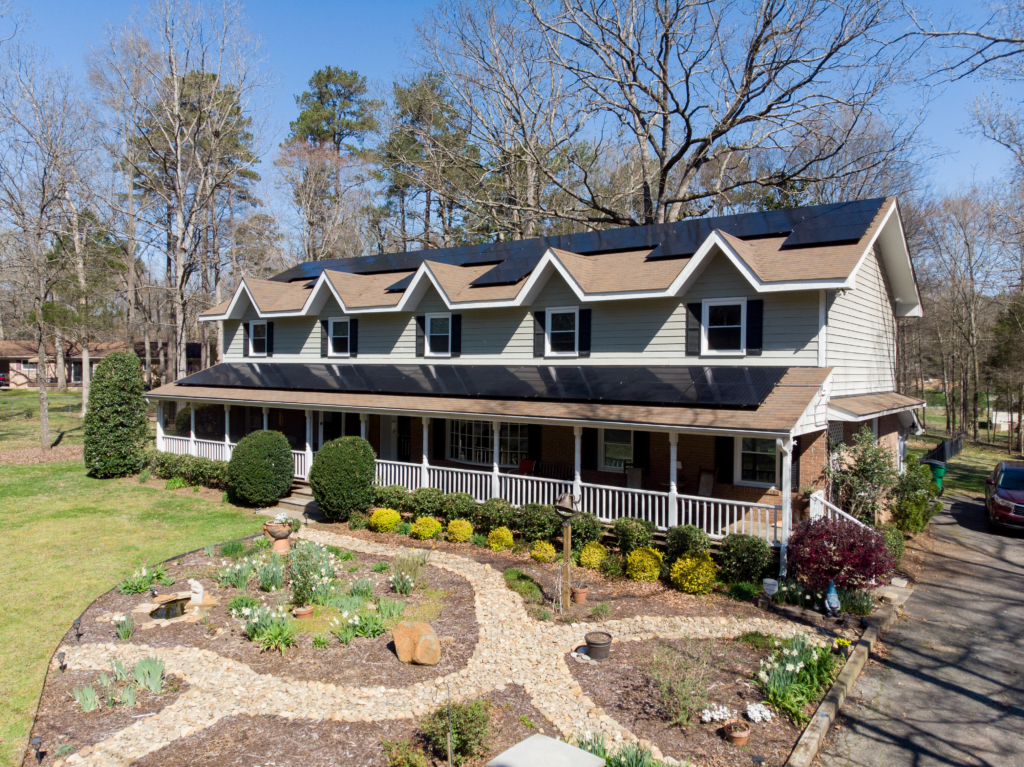Home Battery Backup
Home Battery Backup for Energy Storage
The next generation of home battery storage has arrived, giving solar customers clean, reliable, and efficient backup power that also reduces their daily dependence on the power grid.
Grid-tied solar electric systems are a great way to save money using free power from the sun. However, most grid-tied solar arrays are designed to shut down when they lose grid connection.
Installing home battery backup along with your solar energy system for home or business is a smart move and can increase the value of your clean energy investment as well as peace of mind when a grid outage strikes.
With an energy storage system for your solar, your life doesn’t get interrupted when the power goes out. In the Carolinas, solar systems stop providing energy when an outage occurs as a safety precaution, preventing injury to neighbors and energy grid workers.
With battery backup, your solar system will be able to continuously keep your house running. The benefits of battery backup for solar power users include:
- Enjoying additional savings on your home battery install by applying the same 30% federal tax that solar installations are qualified for
- Keeping access to your solar power in the event of a grid power outage
- Grid-connected solar users without battery storage have to use grid energy at certain times – for example at night – and the utility energy mix includes conventional, dirty sources. Battery owners can use their solar essentially 24/7 and can pursue a truly 100% renewable energy home.
- Discover a greater degree of energy autonomy and assert maximum control over your own energy future
When you pair solar electricity with battery storage, you can supply critical loads of energy in your home or business.
Renu Energy Solutions is also a Tesla Powerwall Certified Installer, which means we offer a customized solar-plus-battery solution that enables you to access the free, abundant power of the sun at your home and reduces your reliance on fossil fuels. Homeowners have been taking advantage of Tesla Powerwall since 2016 with Renu Energy Solutions.
Home Battery or Generator?
Some homeowners find solar energy especially attractive as a source of energy to fall back on if the grid goes down; however, for safety reasons, here in the Carolinas it’s necessary to pair your solar with battery storage in order to use the solar energy you’ve produced during a utility outage.
If you already own a propane or diesel generator, you already have a backup energy source should the lights go out. An energy storage product, like the sonnenBatterie or Tesla Power Wall, represents an alternative to gas-powered means of generating power for critical purposes in an emergency, like refrigeration needed to chill medications and keep food fresh, or running medical devices or a wifi router to keep devices connected.
What is a Tesla Powerwall
Tesla Powerwall is a rechargeable lithium-ion battery designed to store energy at a residential level for backup power and self-consumption of solar power generation. Powerwall 2.0 can store up to 13.5 kWh of clean energy that with or without Solar can provide power to your home even when the grid is down. The unit mounts seamlessly on a wall and is integrated with the local grid to harness excess power and give customers the flexibility to draw energy from their own reserve.
Benefits of the Tesla Powerwall
If you live in the Carolinas, you know high winds and severe weather cause frequent power outages that impact consumers for days, if not weeks. With solar and Tesla Powerwall, you can continue to generate and consume power for your most important appliances and devices even when your neighbors have no energy.
With a Renu Solar + Tesla Powerwall(s) solution, the ability to ensure that 100% of the energy your home consumes is clean is now within reach.
Choose Smart. Reliable. Solar for Your Home Battery Backup
Energy storage pairs perfectly with solar: the Powerwall is compatible with previously installed Renu Energy Solutions solar electric systems. Tesla Powerwall increases the capacity for a household’s solar consumption, while also offering backup functionality during grid outages. Contact us to add storage!

Frequently Asked Questions About Solar for Your Home:
How exactly does going solar and a solar system itself work?
How many solar panels do I need for my home?
Roof-size/available space: When we look at the size of your roof and the space available, we gather data that tell us the maximum number of solar panels your home or site can hold and we even consider shading. We use a software “Suneye” which takes a 360 picture of your roof and we use this photo to determine if your home is a good candidate for solar.
Energy Usage: When we determine energy usage we look at your past electrical bills from over the course of a year to make sure your system isn’t too big or too small.
Your Budget: We take your budget seriously and most importantly, we want you to be satisfied with our services. We take your feedback on how much you want to spend so that we can size your system appropriately.
What is solar net-metering?
Does Duke Energy offer net-metering?
Curious about the cost of a home solar system?
Ready to Own Your Own Energy?
Speak to Us Today!
